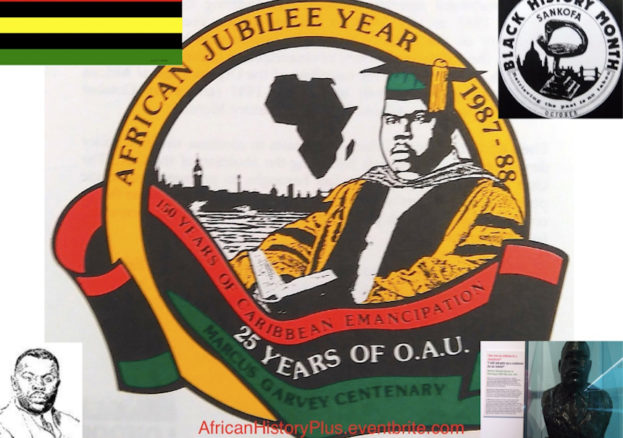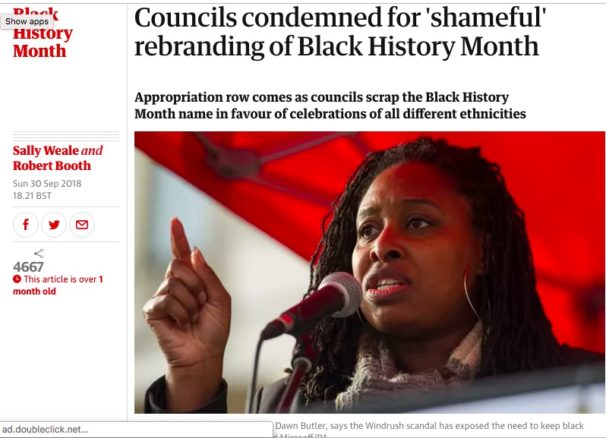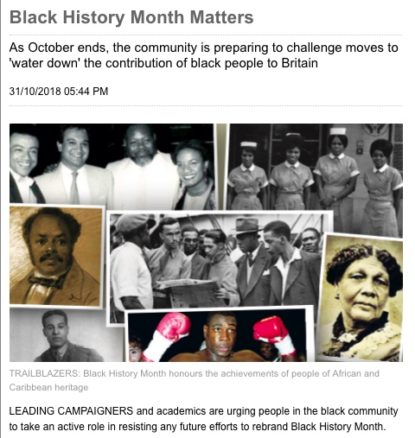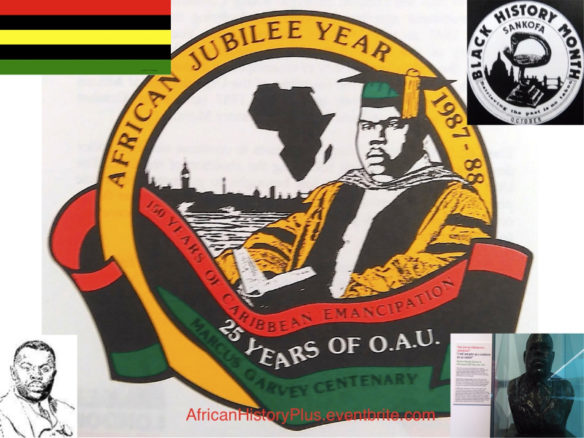

Before the recent African History Month had ended, there were stories in the press about the white-washing, diversifying and rebranding of Black History Month, such as The Guardian’s ‘Councils Condemned For ‘Shameful’ Rebranding Of Black History Month’ and The Voice’s front cover story ‘Black History Month Matters’ throws up a number of issues, some of which will be highlighted at the Commemorating African Jubilee Year 1987-88 @ 30 event I’m convening at London’s City Hall on November 26.

Of course, it’s right that the African community expresses its indignation at what has been described as moves to ‘water down’ contributions of people of African heritage to British society. Two London boroughs, Hillingdon and Wandsworth, are criticised for having changed October’s Black History Month (BHM) to Culture Bite and Diversity Month respectively.
Incidentally, in 2007, the year of the 20th anniversary of the introduction of BHM UK and the 200th anniversary of the Abolition Of The Slave Trade Act, Hillingdon and Westminster councils produced the best BHM booklets. Ironically by then, Hillingdon had began abandoning BHM for Hillingdon History Month.
Hillingdon Councillor June Nelson informed us of the change towards the celebration of all cultures when she attended ‘Abolition Truths’, the Harrow Council BHM programme I delivered in 2007. We suggested a two-prong approach. Demanding that Hillingdon Council re-instate BHM, whilst also working with community groups such as ours, BTWSC (Beyond The Will Smith Challenge), and others to deliver BHM programmes within the Civic Centre and other community spaces. That was not to be, and ten years on Nelson’s motions for the re-instatement of BHM continue to be voted down by the Conservative-led council.
Whilst this year’s Culture Bite programme continues to be devoid of any obvious African history content, the same can not be said of Wandsworth’s Diversity Month programme. I’ve delivered African programmes for Wandsworth Library. In 2012, I delivered a programme to commemorate the centenary of the death of African British composer Samuel Coleridge-Taylor, under the BHM banner.
By the time I delivered a programme in 2014 to mark the centenary of the start of the First World War, the branding had changed to Diversity Month. However, although it’s right to challenge the change, from my experience there are more nuggets of important African history focused events in Wandsworth’s programmes than in some boroughs which use the BHM banner, but provide essentially entertainment, from face-painting to musical performances. One African history focused event I attended in Wandsworth this year was a National Archive delivered programme in Battersea Library on the history of the 1919 race riots, which took place in various seaports in Britain.
Whilst we focus on the councils that are ‘watering down’ BHM, it’s important not to ignore the beacons of hope. My attention was drawn to the work of Hackney Museum when it produced ‘Sankofa: The Truth Behind Black History Month 1926-2013’. Although this excellent exhibition run for a season – October 2013 to January 2014, it was not long enough. So with permission from the Museum, I filmed and posted a video on Youtube.
The Museum continues its good work by consulting with the local African communities. The current season’s exhibition, which ends in March 2019 is ‘Roots, Rhythms & Records: The Sounds And Stories Of African And Caribbean Music In Hackney’. This incidentally was inspired by ‘The Antiuniversity History Of Black Music In Britain’ presentation I delivered in the Museum in 2016, as part of British Black Music Month.`
It was at a Black Music Congress (BMC) debate over ten years ago that then Harrow councillor Nana Asante alerted us to a move by Harrow Council to rebrand BHM to something along the lines of Festival Of Cultures. Subsequently myself and some BMC delegates began attending Harrow BHM Group meetings.
Slowly, we moved the Asian-dominated Group’s BHM events that had little focus on African history to programmes that focused solely on African history. The argument the revamped Group made was that BHM should be African history focused, and that it was like a bus that ought to be driven by informed Africans, but all sections of the community were welcome to participate as passengers.
In moving towards an African focus, it was pointed out that the borough marked other cultural and faith celebrations, such as Mela, Navatri, Diwali, Eid, and Rosh Hashanah without diluting the essence.
More importantly in 2012, during the 25 Years On… event that highlighted the silver anniversary of the introduction of BHM UK and the election of the first three African MPs, we renamed BHM African History Month (or Season), to align it with the ethos of the African Jubilee Year Declaration.

If you have not heard of the Declaration, it’s not surprising. Because whilst BMH has become embedded within the nation’s cultural calendar, marked by the Prime Minister, statutory bodies, schools and community organisations, very few people seem to have heard of the Declaration, which actually gave rise to the marking of BHM annually in October.
The Declaration encouraged the naming of buildings, streets, parks and monuments after progressive Africans, in order to highlight the contributions of Africans to the cultural, economic and political life of London and the UK.
Pertinent to the issue of ‘watering down’ and rebranding BHM, the Declaration also enjoined London councils to support BHM in a bid to promote good community relations, as ascribed by the 1976 Race Relations Act.
The Declaration was part of the African Jubilee Year 1987-88 (AJY) celebrations, which to a large extent was inspired by the centenary of the birth of Jamaican-born pan-Africanist champion Marcus Garvey in 1887. AJY, which covered a pan-Africanist world view, also marked the 150th anniversary of the so-called emancipation of enslaved Africans in the British Caribbean, and the 25th anniversary of the founding of the OAU (Organisation of African Unity).
Sally Mugabe stood in for Zimbabwean President Robert Mugabe who had to attend an OAU meeting, as the keynote speaker at the AJY launch on July 31 1987 at Central Hall Westminster. Her host was Linda Bellos, then chair of the LSPU (London Strategic Policy Unit).
Even though the idea had been conceived by the Ghanaian-born Akyaaba Addai-Sebo, a special projects advisor at the GLC (Greater London Council), it was the LSPU that birthed AJY and BHM in 1987. The original idea of Addai-Sebo, who had run African history programmes in the US, was for BHM UK to run as a Season – from October through December, thereby overlapping Kwanzaa, then into February, which is when the north Americans mark BHM.
To find out more about the BHM backstory, you can book the Commemorating African Jubilee Year 1987-88 @ 30 event at City Hall on November 26 at www.AfricanHistoryPlus.eventbrite.com.
Kwaku is a London-based music industry and history consultant. His book ‘Look How Far We’ve Come: Disrupting African British History Narratives?’ will out in 2019.
